#Supreme Court accountability
Text

the fix is in!!
#Supreme Court corruption#judicial integrity#legal ethics#accountability#justice system reform#transparency#judicial independence#public trust#legal oversight#ethical standards#judicial misconduct#Supreme Court accountability#judicial power#political thuggery#institutional limits#checks and balances#public pressure#media coverage#judicial reform#democratic principles#constitutional interpretation#judicial impartiality#judicial appointments#separation of powers#government accountability#supreme court ruling#presidential immunity case#Trump legal arguments#congressional impeachment power#criminal charges
139 notes
·
View notes
Link
The Supreme Court handed down a decision on Wednesday which effectively gives Border Patrol agents who violate the Constitution total immunity from lawsuits seeking to hold them accountable.
Justice Clarence Thomas’s majority opinion in Egbert v. Boule, moreover, has implications that stretch far beyond the border. Egbert guts a seminal Supreme Court precedent, Bivens v. Six Unknown Named Agents (1971), which established that federal law enforcement officers who violate the Constitution may be individually sued — and potentially be required to compensate their victims for their illegal actions.
Egbert is a severe blow to the broader project of police accountability. While it does not target lawsuits against state law enforcement officers who violate the Constitution, it all but eliminates the public’s ability to sue border patrol officers — and possibly all federal officers — who commit similar violations.
In fairness, Egbert does indicate that people who believe their rights were violated by federal law enforcement may file a grievance with the law enforcement agency that employs the officer who allegedly violated the Constitution. But such grievances will be investigated by other law enforcement officers, and no court or other agency can review a law enforcement officer’s decision to exonerate a fellow officer.
And, perhaps most importantly, Egbert most likely shuts down a civil rights plaintiffs’ ability to be compensated if their rights are violated.
#article#excerpt#full article at link#us supreme court#police brutality#police accountability#border patrol#us politics#us legal system
2K notes
·
View notes
Text
the girlbossification of ruth bader ginsburg has to be one of the most just plain annoying aspects of white liberal feminism. like it's not as actively harmful as a lot of other shit obviously. but it is soooooo annoying. if I never see another notorious rbg tote bag as long as I live it will be too soon
#her opinions and amicus' in many cases were iconic! not denying that certainly. she is absolutely AMONG the better justices in us history#HOWEVER her record on policing/the carceral system is very bad! genuinely bad!#and she just would not hold the conservative justices accountable. her and kagan are way too placating#and then she refused to retire in 2009 when there was a sitting democratic president and a fucking DEMOCRATIC SUPER MAJORITY#saying basically that no one else could do the job as well as her which is insane because sotomayor and KBJ literally are better :/#its also unbelievably conceited and just incredibly fucking selfish to knowingly doom the country because you think youre hot shit#started ranting abt this at work bc literally any talk even adjacent to the supreme court will set me off abt all of us court history#and my coworker was like 'well i dont think its very fair that she had to have that much riding on her decision to retire'#it literally is fair because that is the fucking job that she signed up for. this has literally always been how it fucking works#its a lifetime appointment. you either die unexpectedly or retire strategically#she accepted a position in which the entire country would depend on her but its not fair for the entire country to depend on her???#bullshit#im not fucking buying it. she did this knowing roe would likely be struck down as a result#she should absolutely be held accountable for that lmfao. you can know that she had a hand in a lot of great decisions for this country#while also knowing that she did a fucked up and extremely selfish thing
85 notes
·
View notes
Text

Only dictators have full immunity from prosecution.
Under the rule of law, everybody is accountable regardless of rank.
#immunity#the rule of law#accountability#dictators#vladimir putin#диктатура#владимир путин#путина в гаагу!#donald trump#trump's legal problems#lock him up!#us supreme court#scotus#jeff danziger#election 2024
12 notes
·
View notes
Text

How steeped in colonialism is our country? Spot what’s missing from Andrew Jackson’s biography on the White House webpage: https://www.whitehouse.gov/about-the-white-house/presidents/andrew-jackson/
ANSWER: There is no mention of the Indian Removal Act - a law signed into place in 1830 (the second year of his eight year ruling!) allowing Jackson to set aside tribal land west of the Mississippi in exchange for tribal lands occupied in the East. The Cherokee Indians of the Georgia state region took this up with the Supreme Court in a case titled “Cherokee Nation v. Georgia.” The Supreme Court ruled in favor of the Cherokee Nation granting them the right to self-govern on their land and stating that Georgia’s extension of state law was unconstitutional. Jackson refused to enforce the courts decision and thus the Trail of Tears began. Keep in mind, the Cherokee Nation had just played a pivotal role in helping Andrew Jackson win the war of 1812. They were allies for the man, and this is how he treated them.
The Cherokee Nation did everything right according to the “system” and still, an abuse of power lead to destruction. This was one of the first legal precedents of our system exploiting and undermining the marginalized.
My life is steeped in hipocracy. Uphold Cherokee v. Georgia!! Accountability for abusive presidents!!
#landback#reparations#cherokee v Georgia#Cherokee#Cherokee Nation#Andrew Jackson#colonialism#fuck colonialism#hypocracy#Supreme Court#abuse of power#hold presidents accountable#life#love#anti capitalism#revolution#the wicked witch of the east#taurus#why does tumblr hate me#anarchy#president#democracy#hipocracy
47 notes
·
View notes
Text
AN OPEN LETTER to THE U.S. HOUSE OF REPRESENTATIVES
Co-sponsor The Judicial Ethics Enforcement Act of 2024!
59 so far! Help us get to 100 signers!
A group of House Democrats, led by Reps. Melanie Stansbury, Ilhan Omar and Jamie Raskin, have introduced legislation that would strengthen oversight of the Supreme Court. I’m writing in support of it.
The Judicial Ethics Enforcement Act of 2024 would authorize the creation of an office of the inspector general to investigate allegations of misconduct in the judicial branch. The inspector general would also investigate alleged violations of the Supreme Court code of ethics, issued in November; conduct and supervise audits; and recommend changes in laws or regulations governing the judiciary. The inspector general would be required to inform the attorney general when they believe there has been a violation of federal criminal law.
Congress must pass this bill. Confidence in the Supreme Court is at an all-time low, and there’s good reason for that. Several of its justices are deeply compromised and everyone can see it.
Please co-sponsor The Judicial Ethics Enforcement Act of 2024 right away, so the provisions in it can begin to restore Americans’ faith in our highest court. Thanks.
▶ Created on April 19 by Jess Craven
📱 Text SIGN PWCSGV to 50409
🤯 Liked it? Text FOLLOW JESSCRAVEN101 to 50409
#JESSCRAVEN101#PWCSGV#resistbot#Supreme Court Reform#Judicial Ethics#Ethics Enforcement#Supreme Court Oversight#Inspector General#Misconduct Investigation#House Democrats#Legislation#Judiciary Oversight#Government Accountability#Transparency#Code Of Ethics#Legal Reform#Congressional Action#Federal Law#Judicial Branch#Legislative Process#Accountability#Justice System#Government Oversight#Ethical Standards#Supreme Court Misconduct#Legal Integrity#Federal Oversight#Legislative Proposal#Legal Ethics#Oversight Committee
3 notes
·
View notes
Text
The dunmeshi fandom getting content every week vs. my obscure fandoms (EarthBound, Columbo, TUA to an extent) not getting content for years
#Godddd. I know Columbo is never coming back because I think Columbo's actor died (if he is dead RIP Mr. Falk you woulda loved ace Attorney)#But EarthBound still has potential#TUA I just don't want to wait until August for#corry speaks#gimmick account#definitely supreme court
2 notes
·
View notes
Text
we need to kill everyone right now
#this is about the supreme court shit#and also elon musk#i can’t even access twitter anymore. i don’t have an account but i use it to check up on people
10 notes
·
View notes
Text
The Supreme Court is being warned about the potentially dire consequences of a case next week involving a Christian graphic artist who objects to designing wedding websites for same-sex couples.
Rule for the designer and the Justices will expose not only same-sex couples but also Black people, immigrants, Jews, Muslims and others to discrimination, liberal groups say.
Rule against her and the justices will force artists — from painters and photographers to writers and musicians — to do work that is against their faith, conservative groups argue.
Both sides have described for the court what lawyers sometimes call “a parade of horribles” that could result if the ruling doesn’t go their way.
The case marks the second time in five years that the Supreme Court has confronted the issue of a business owner who says their religion prevents them from creating works for a gay wedding. This time, most experts expect that the court now dominated 6-3 by conservatives and particularly sympathetic to religious plaintiffs will side with Lorie Smith, the Denver-area designer in the case.
But the American Civil Liberties Union, in a brief filed with the court, was among those that called Smith’s argument “carte blanche to discriminate whenever a business’s product or service could be characterized as ‘expressive,’” a category of businesses that could range from “luggage to linens to landscaping.” Those businesses, they said, could announce, “We Do Not Serve Blacks, Gays, or Muslims.”
Smith’s attorneys at the Arizona-based Alliance Defending Freedom say that’s not true. “I think it’s disingenuous and false to say that a win for Lorie in this case would take us back to those times where people ... were denied access to essential goods and services based on who they were,” said ADF attorney Kellie Fiedorek, adding, “A win for Lorie here would never permit such conduct, like some of the hypotheticals that they’re raising.”
Smith’s case follows that of Colorado baker Jack Phillips, who objected to creating a wedding cake for a gay couple. The couple sued, but the case ended with a limited decision. Phillips’ lawyer, Kristen Waggoner, is back before the high court Monday arguing for Smith.
Smith wants to begin offering wedding websites, but she says her Christian faith prevents her from creating websites celebrating same-sex marriages. That could get her in trouble with state law. Colorado, like most other states, has a public accommodation law that says if Smith offers wedding websites to the public, she must provide them to all customers. Businesses that violate the law can be fined, among other things.
Smith, for her part, says Colorado’s law violates the Constitution’s First Amendment by forcing her to express a message with which she disagrees.
Among Smith’s other opponents are the Biden administration and 20 mostly Democratic-leaning states including California, New York and Pennsylvania. The states told the court in one of 75 legal briefs filed by outside groups in the case that accepting Smith’s arguments would allow for widespread discrimination.
“A bakery whose owner opposed mixed-race relationships could refuse to bake wedding cakes for interracial couples,” the states said. A “real estate agency whose owner opposed racial integration could refuse to represent Black couples seeking to purchase a home in a predominantly white neighborhood; or a portrait studio whose proprietor opposes interracial adoption could refuse to take pictures of white parents with their Black adopted children.”
Those race-based examples could get particular attention on a court with two Black Justices, Clarence Thomas and Ketanji Brown Jackson, who are married to white spouses and another Justice, Amy Coney Barrett, who has two adopted children who are Black. But the states gave an example involving a person’s national origin too. “A tattoo studio could ink American flag tattoos on customers born in the United States while refusing to sell identical tattoos to immigrants,” they said.
Brianne Gorod of the Constitutional Accountability Center, representing a group of law professors, hypothesized other examples of what could happen if Smith succeeds at the high court.
“A web designer could refuse to create a web page celebrating a female CEO’s retirement — violating Colorado’s prohibition on sex discrimination — if he believed all women have a duty to stay home and raise children. Similarly, a furniture-maker — who considers his furniture pieces to be artistically expressive — could refuse to serve an interracial couple if he believed that interracial couples should not share a home together. Or an architect could refuse to design a home for an interfaith couple,” she told the court.
Smith’s supporters, however, among them 20 mostly Republican-leaning states, say ruling against her has negative consequences, too. A lawyer for the CatholicVote.org education fund told the court that if the lower court ruling stands and Smith loses, “a Jewish choreographer will have to stage a dramatic Easter performance, a Catholic singer will be required to perform at a marriage of two divorcees, and a Muslim who operates an advertising agency will be unable to refuse to create a campaign for a liquor company.”
The Jewish Coalition for Religious Liberty put it differently, telling the court that a Jewish baker could have to fulfill the request of a Neo-Nazi who wants a cake saying “Happy November 9th!” — a reference to Kristallnacht, the night in 1938 when Nazis burned synagogues and vandalized Jewish businesses throughout Germany and Austria.
Alan B. Morrison, a constitutional law expert at Georgetown University, underscored that Smith doesn’t currently do wedding websites, making the case particularly speculative and, he says, problematic. Still, Morrison chuckled at some of the hypothetical scenarios both sides came up with, suggesting they are “a bit overblown.”
The examples, he said, are “the kind of thing a law professor would think of.”
#us politics#news#ap news#us supreme court#scotus#303 creative llc v. elenis#homophobia#lgbtqia+ rights#lgbtqia+#discrimination#American Civil Liberties Union#Lorie Smith#Alliance Defending Freedom#Kellie Fiedorek#Jack Phillips#Kristen Waggoner#us constitution#1st amendment#Constitutional Accountability Center#Brianne Gorod#CatholicVote.org#Jewish Coalition for Religious Liberty#Alan B. Morrison
16 notes
·
View notes
Text
I gotta tone it down I keep forgetting you can’t say whatever you want on Twitter. I called Marjorie Taylor Greene a wretched old hag and some Texas assclown a moron and now I’m just waiting to be banned
#honestly so be it#I’ll make a new account#can’t stop me#roe v wade#abortion#supreme court#us politics#rach post#I am LIVID#this is my version of punching nazis#calling pro birthers morons and idiots#I’m gonna start getting more aggressive soon#these fuckers are STUPID#scotus
5 notes
·
View notes
Text
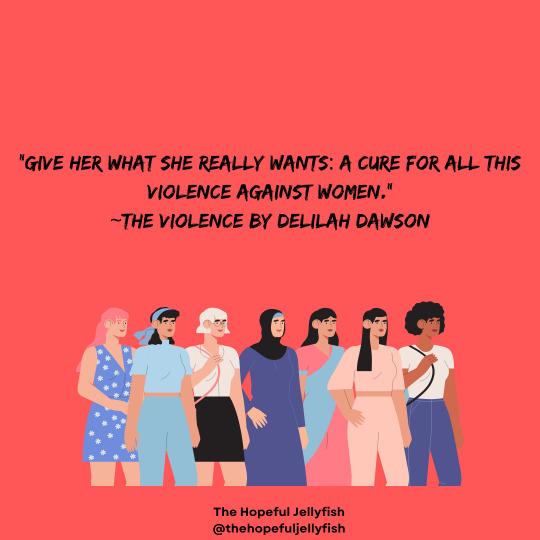
4 notes
·
View notes
Text
पेशेवर लापरवाही के लिए वकीलों पर मुकदमा नहीं हो सकता : Supreme Court
New Delhi: सुप्रीम कोर्ट ने मंगलवार को एक फैसले में कहा कि सेवाओं में कमी के लिए अधिवक्ताओं को उपभोक्ता संरक्षण अधिनियम के तहत जवाबदेह नहीं ठहराया जा सकता।
न्यायमूर्ति बेला त्रिवेदी और न्यायमूर्ति पंकज मिथल की पीठ ने कहा कि उपभोक्ता संरक्षण अधिनियम, 2019 का उद्देश्य और विषय केवल उपभोक्ताओं को अनुचित प्रथाओं एवं अनैतिक व्यावसायिक प्रथाओं से सुरक्षा प्रदान करना है। विधायिका का इरादा कभी भी व्यवसाय…

View On WordPress
#advocates cannot be held accountable#for deficiency in services#The Supreme Court#under the Consumer Protection Act
0 notes
Text
Supreme Court Clears Path for MCA-Nepal to Issue New Tender for Contractor Selection
With six months of the five-year project already passed, MCA-Nepal struggles to appoint contractors and complete land acquisition process
KATHMANDU, March 1: Millennium Challenge Account Nepal (MCA-Nepal) has overcome a hurdle for awarding a new contract for construction of electricity transmission lines after the Supreme Court issued a verdict dismissing the writ petition filed against the…

View On WordPress
0 notes
Text
Women's Not So Distant History
This #WomensHistoryMonth, let's not forget how many of our rights were only won in recent decades, and weren’t acquired by asking nicely and waiting. We need to fight for our rights. Here's are a few examples:

📍 Before 1974's Fair Credit Opportunity Act made it illegal for financial institutions to discriminate against applicants' gender, banks could refuse women a credit card. Women won the right to open a bank account in the 1960s, but many banks still refused without a husband’s signature. This allowed men to continue to have control over women’s bank accounts. Unmarried women were often refused service by financial institutions entirely.
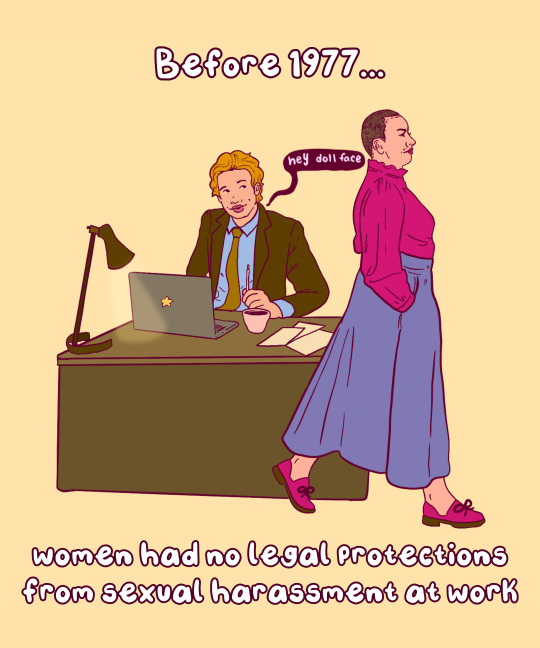
📍 Before 1977, sexual harassment was not considered a legal offense. That changed when a woman brought her boss to court after she refused his sexual advances and was fired. The court stated that her termination violated the 1974 Civil Rights Act, which made employment discrimination illegal.⚖️
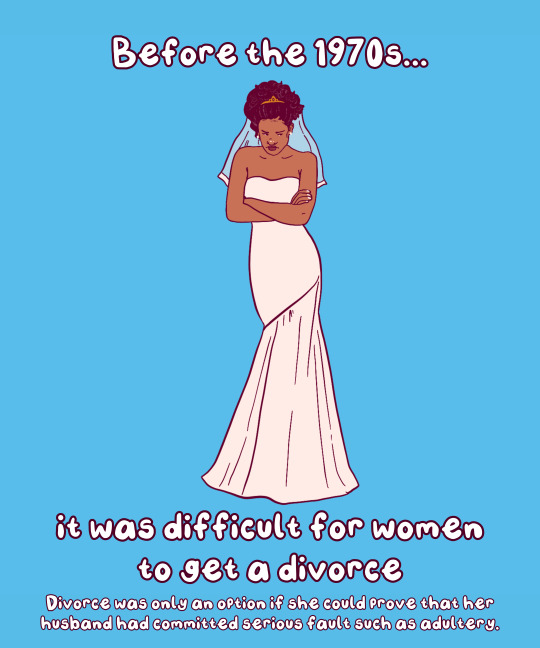
📍 In 1969, California became the first state to pass legislation to allow no-fault divorce. Before then, divorce could only be obtained if a woman could prove that her husband had committed serious faults such as adultery. 💍By 1977, nine states had adopted no-fault divorce laws, and by late 1983, every state had but two. The last, New York, adopted a law in 2010.
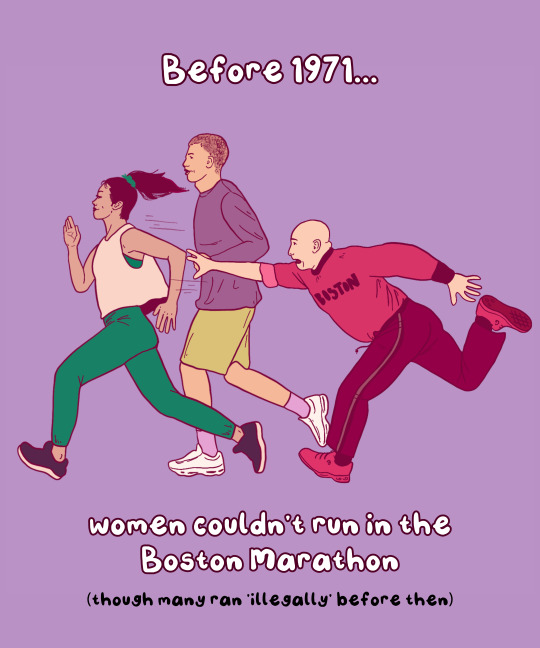
📍In 1967, Kathrine Switzer, entered the Boston Marathon under the name "K.V. Switzer." At the time, the Amateur Athletics Union didn't allow women. Once discovered, staff tried to remove Switzer from the race, but she finished. AAU did not formally accept women until fall 1971.

📍 In 1972, Lillian Garland, a receptionist at a California bank, went on unpaid leave to have a baby and when she returned, her position was filled. Her lawsuit led to 1978's Pregnancy Discrimination Act, which found that discriminating against pregnant people is unlawful
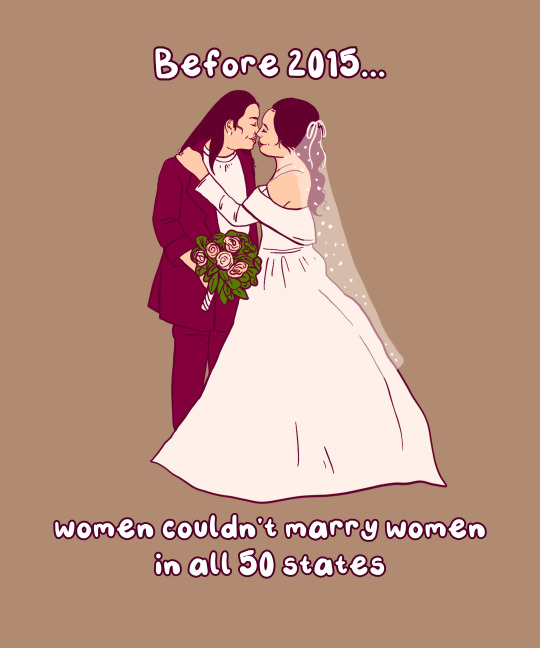
📍 It wasn’t until 2016 that gay marriage was legal in all 50 states. Previously, laws varied by state, and while many states allowed for civil unions for same-sex couples, it created a separate but equal standard. In 2008, California was the first state to achieve marriage equality, only to reverse that right following a ballot initiative later that year.

📍In 2018, Utah and Idaho were the last two states that lacked clear legislation protecting chest or breast feeding parents from obscenity laws. At the time, an Idaho congressman complained women would, "whip it out and do it anywhere,"
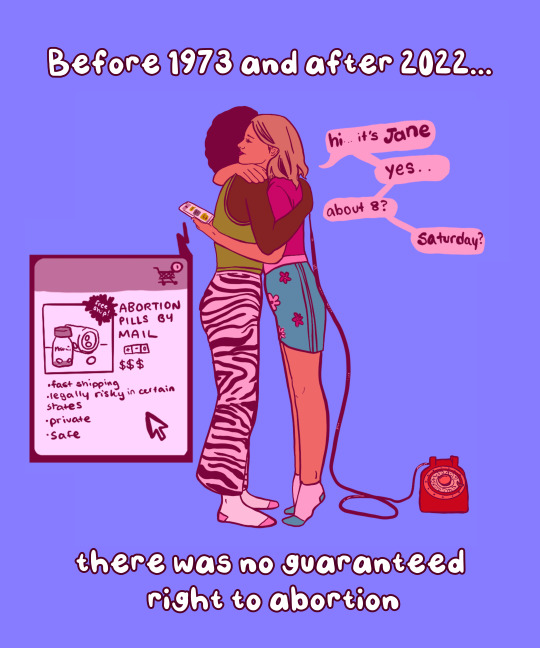
📍 In 1973, the Supreme Court affirmed the right to safe legal abortion in Roe v. Wade. At the time of the decision, nearly all states outlawed abortion with few exceptions. In 1965, illegal abortions made up one-sixth of all pregnancy- and childbirth-related deaths. Unfortunately after years of abortion restrictions and bans, the Supreme Court overturned Roe in 2022. Since then, 14 states have fully banned care, and another 7 severely restrict it – leaving most of the south and midwest without access.
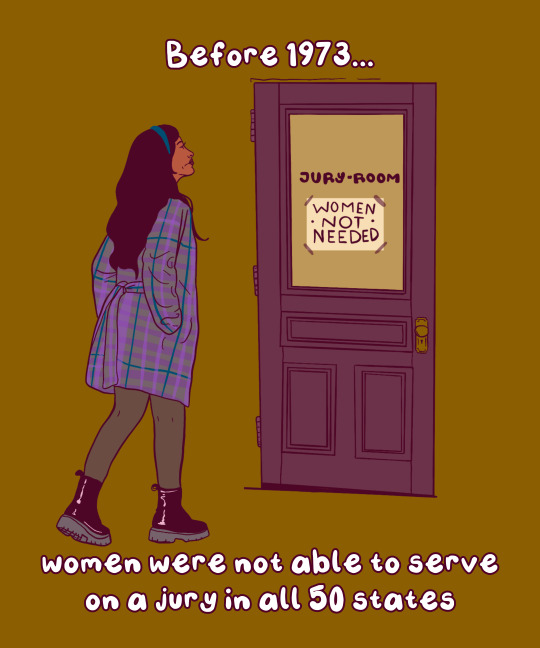
📍 Before 1973, women were not able to serve on a jury in all 50 states. However, this varied by state: Utah was the first state to allow women to serve jury duty in 1898. Though, by 1927, only 19 states allowed women to serve jury duty. The Civil Rights Act of 1957 gave women the right to serve on federal juries, though it wasn't until 1973 that all 50 states passed similar legislation

📍 Before 1988, women were unable to get a business loan on their own. The Women's Business Ownership Act of 1988 allowed women to get loans without a male co-signer and removed other barriers to women in business. The number of women-owned businesses increased by 31 times in the last four decades.
Free download
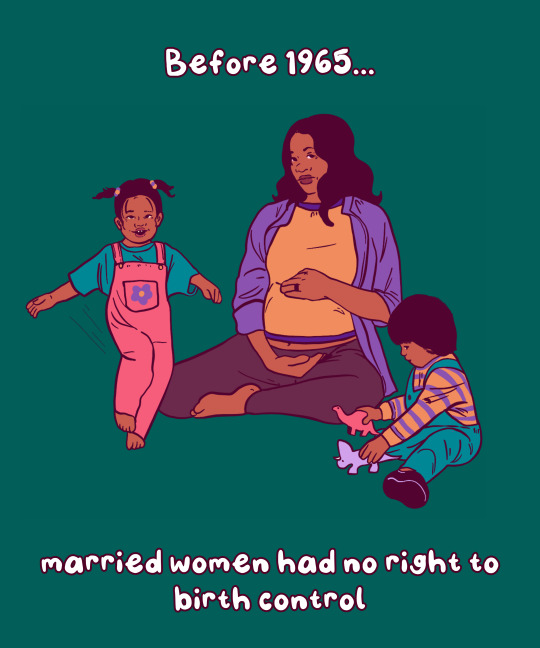
📍 Before 1965, married women had no right to birth control. In Griswold v. Connecticut (1965), the Supreme Court ruled that banning the use of contraceptives violated the right to marital privacy.
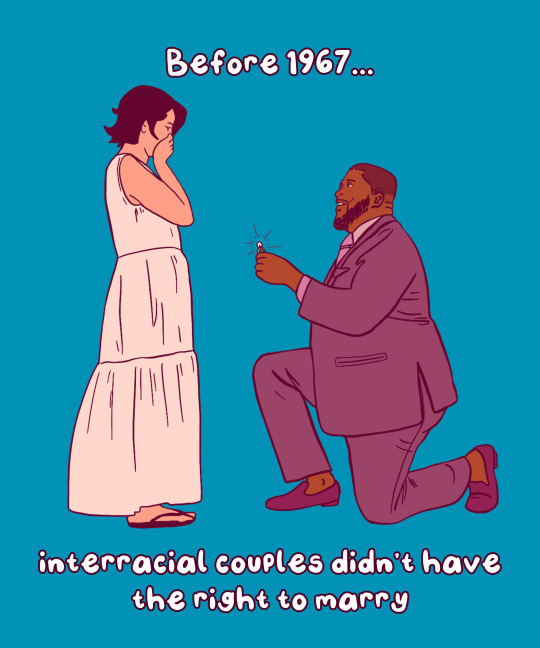
📍 Before 1967, interracial couples didn’t have the right to marry. In Loving v. Virginia, the Supreme Court found that anti-miscegenation laws were unconstitutional. In 2000, Alabama was the last State to remove its anti-miscegenation laws from the books.

📍 Before 1972, unmarried women didn’t have the right to birth control. While married couples gained the right in 1967, it wasn’t until Eisenstadt v. Baird seven years later, that the Supreme Court affirmed the right to contraception for unmarried people.
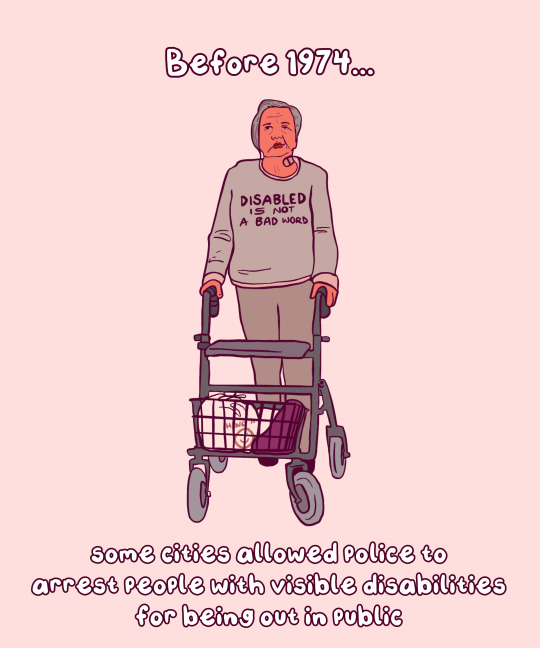
📍 In 1974, the last “Ugly Laws” were repealed in Chicago. “Ugly Laws” allowed the police to arrest and jail people with visible disabilities for being seen in public. People charged with ugly laws were either charged a fine or held in jail. ‘Ugly Laws’ were a part of the late 19th century Victorian Era poor laws.

📍 In 1976, Hawaii was the last state to lift requirements that a woman take her husband’s last name. If a woman didn’t take her husband’s last name, employers could refuse to issue her payroll and she could be barred from voting.

📍 It wasn’t until 1993 that marital assault became a crime in all 50 states. Historically, intercourse within marriage was regarded as a “right” of spouses. Before 1974, in all fifty U.S. states, men had legal immunity for assaults their wives. Oklahoma and North Carolina were the last to change the law in 1993.
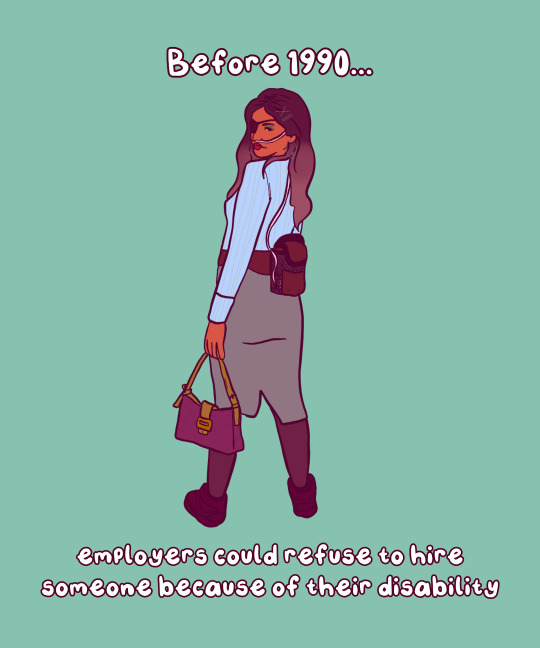
📍 In 1990, the Americans with Disability Act (ADA) – most comprehensive disability rights legislation in U.S. history – was passed. The ADA protected disabled people from employment discrimination. Previously, an employer could refuse to hire someone just because of their disability.
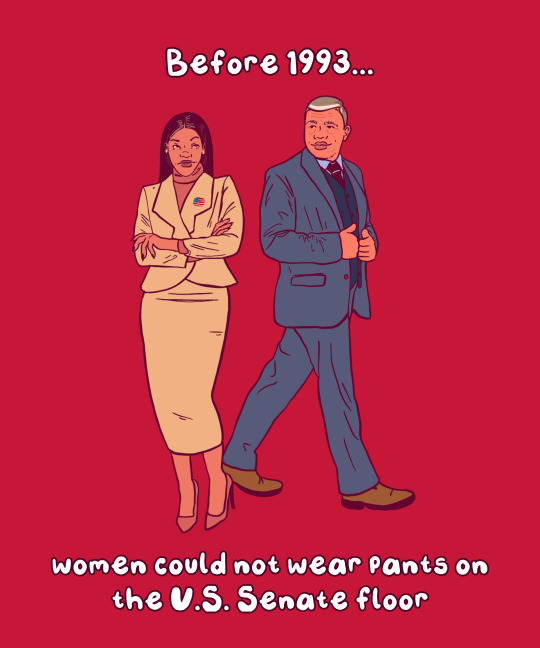
📍 Before 1993, women weren’t allowed to wear pants on the Senate floor. That changed when Sen. Moseley Braun (D-IL), & Sen. Barbara Mikulski (D-MD) wore trousers - shocking the male-dominated Senate. Their fashion statement ultimately led to the dress code being clarified to allow women to wear pants.

📍 Emergency contraception (Plan B) wasn't approved by the FDA until 1998. While many can get emergency contraception at their local drugstore, back then it required a prescription. In 2013, the FDA removed age limits & allowed retailers to stock it directly on the shelf (although many don’t).
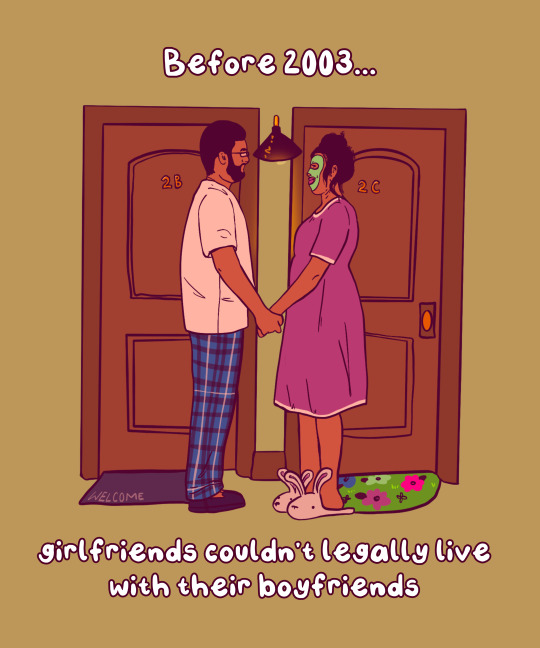
📍 In Lawrence v. Texas (2003), the Supreme Court ruled that anti-cohabitation laws were unconstitutional. Sometimes referred to as the ‘'Living in Sin' statute, anti-cohabitation laws criminalize living with a partner if the couple is unmarried. Today, Mississippi still has laws on its books against cohabitation.
#art#feminism#women's history#women's history month#iwd2024#international women's day#herstory#educational#graphics#history#70s#80s#rights#women's rights#human rights
15K notes
·
View notes
Text
11th Accountancy - Conceptual Framework of Accounting Chapter 2
I. Multiple Choice Questions : Choose the Correct Answer
Question 1:
The business is liable to the proprietor of the business in respect of capital introduced by the person according to ………………
(a) Money measurement concept
(b) Cost concept
(c) Business entity concept
(d) Dual aspect concept
Answer:
(c) Business entity concept
Question 2:
The concept which assumes that a business will…
View On WordPress
#Accounting period#Accounting standard#Bad debt#Depreciation#FYI#Institute of Chartered Accountants of India#Medium of exchange#Money measurement concept#Reserve Bank of India#Revenue recognition#Stock valuation#Supreme Court of India
0 notes
Text
Clarence and Harlan sitting in a tree
B-R-I-B-I-N-G
0 notes